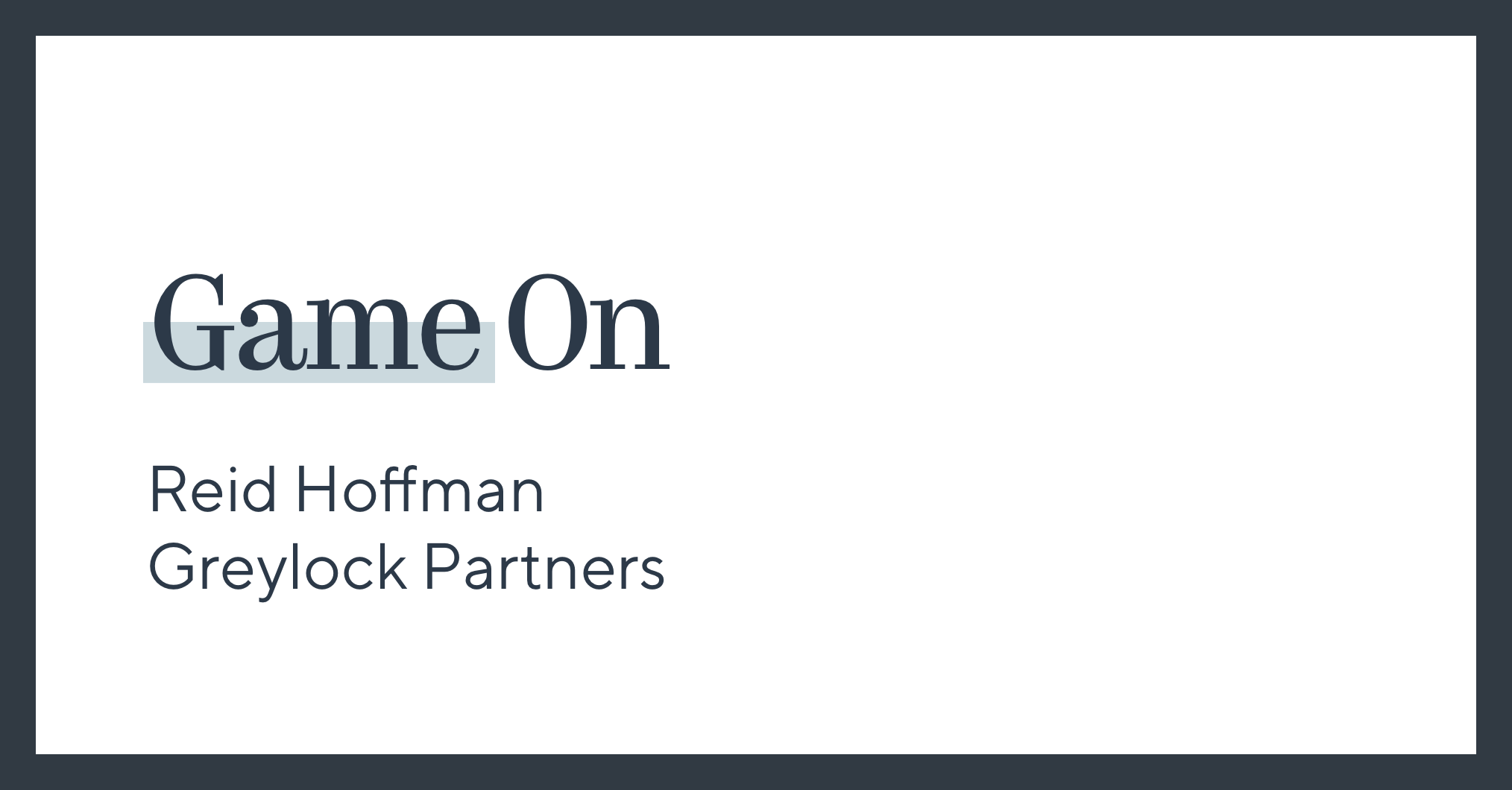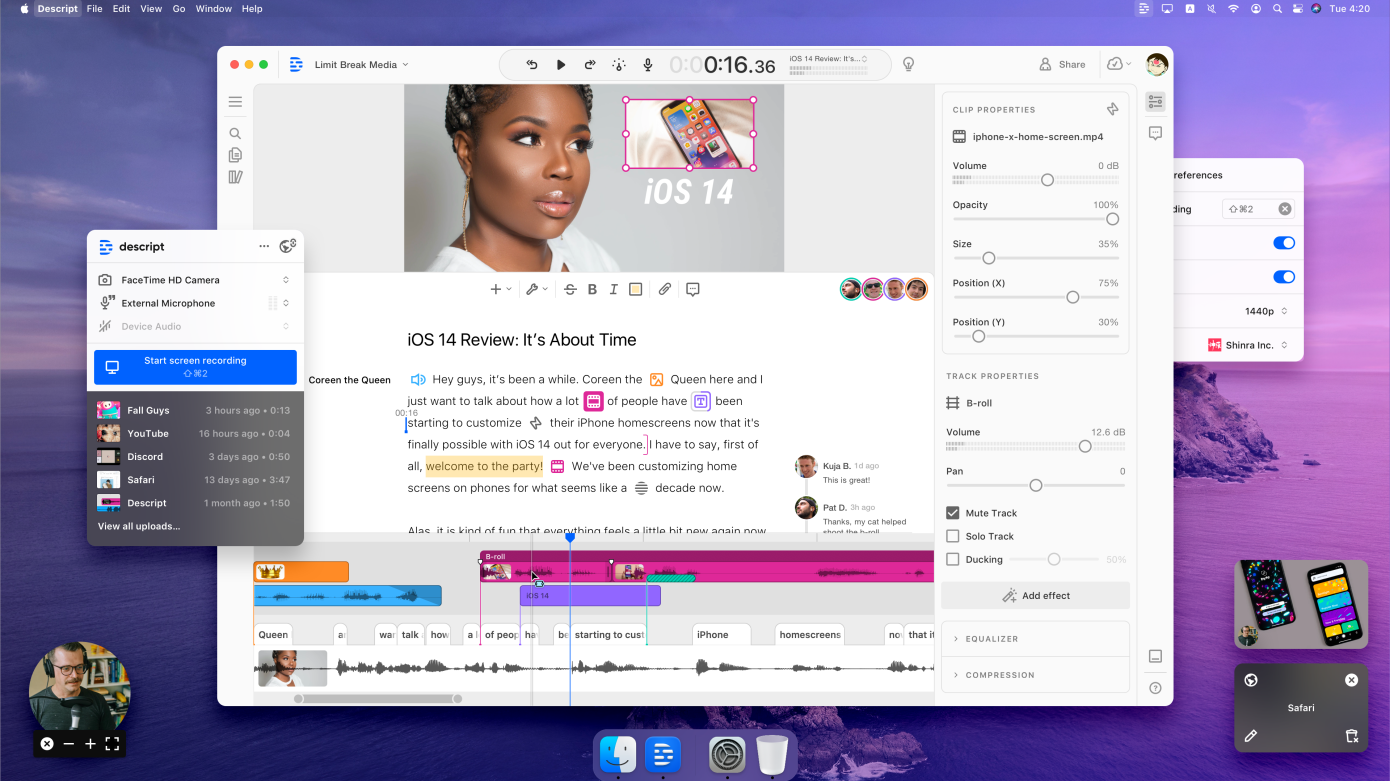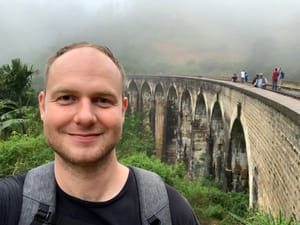✍🏼 Editorial - by Danu Poyner
🎙 Still Curious Podcast - James Birt - mixed reality, computer games and e-sports educator
5️⃣ Links - Myles Tankle's 5 links for grokking video editing, lighting and cinematography
🗯 Lessons Learned - Danu Poyner reviews the Quantic EMBA program
🍬 Snackables - assorted awesome learning links
✍🏼 Introductions
It's a critical time in education. The pandemic has jump-started the long-overdue digital transformation and the waves of venture capital money that were already flowing into the sector are becoming a king tide.
Over the next decade, this means that tech money and the aims, aspirations and assumptions that come with it are likely to fundamentally reshape what education looks like. Software eats the world and education is next on the menu.
I am ambivalent about this, which is to say I have strong feelings on both sides. I am no lover of school-based institutions and the way they tend to bureaucratise learning with determined mediocrity. I am also no lover of the way Silicon Valley thinking might lead us to treat education as just another human resource (like attention or relationships) that can be strip-mined for assets to be weaponised in a hypercapitalist social arena.
Of course, everywhere and at all times, there are always good people to be found, toiling in various unheralded but important ways. As we enter new and uncertain times in education, I am reminded that where there are new beginnings, there is hope, and where certainty ends, thinking begins. So my attitude to the coming disruption is to be thoughtful, and hopeful.
Education can mean many things to many people. A way to master a skill, solve a problem or meet the right people. A source of pride, prestige or social mobility, or perhaps a shiny new profit centre.
But as well as the many ways to engage with education primarily for its use-value, crucially, it also remains a worthwhile end for its own sake. A hand that reaches down to us through time. A voice that quickens the heart, energises the mind and ignites the soul. A kind of leisure that touches the human spirit and enriches our common lives, our families and communities.
Or, as classicist Daniel Mendelsohn puts it, 'when your father dies, your accounting degree is not going to help you at all to process that experience. Homer will help you.'
In short, when I think about education, I think of it not as a tool of capital or the state, but as one of the essential goods of a life well lived for its own sake, and as a mode of exchange for creativity, relationships and wisdom.
With Scholé Supplement, my aim is to make a peaceful space for learning as leisure (which is the original meaning of the word 'school', but more on that another day). So don't treat this newsletter as another thing you need to feel bad about for not keeping up with, or as a noisy companion pestering you to win at life. Think of it instead as something to spark your curiosity, inspire you to action, or as a refuge on days when the energy vampires have been biting.
The older I get, I the more grateful I am for the wonderful and wholesome spaces, people and things that are just reassuringly there, when really no-one asked or expected them to be. Those sanctuaries have saved me more than once, and the hope of finding more is what gets me out of bed with a spring in my step each morning.
If I can create such a sanctuary for a few good people who care about education in the same way I do, then I will be a rich man indeed.
- Danu
Still Curious Podcast
Featured Episode

In this conversation we explore the pedagogical value of games, esports, entrepreneurship, virtual reality and hackathons.
I've noticed that in fields like the games industry in particular, formal learning and credentials seem to matter a lot less than being able to show people what you’ve done. There’s more of a ‘game jam’ ethic of learning by doing stuff, having a body of work and putting yourself out there, so I wanted to ask James for his perspective on this in particular.
It turns out James has a lot to say about this. It was one of the most nuanced and even-handed conversations I've had about technology, learning and the role of universities in the current educational landscape, and we ended up talking for several hours. This presented a major editing challenge, but I trust we have been kind to your ears in the final edit, dear listener.
In this episode
- Using virtual reality in the classroom
- How games taught James important life skills
- Innovation and entrepreneurship in education and tensions between formal and informal modes of learning
- The pedagogical value of game jams and hackathons
- Parallels between e-sports and regular sports
- How games helped James when he broke his back
- The importance of standards and governance and an argument for formalised education
5️⃣ Links
Guests share their five favourite links for grokking That Thing that lights them up
Myles Tankle's 5 links for grokking...
Video editing, lighting and cinematography

I love this stuff because with any art, there is literally no end to what can be created and how it can be created. Video production at all levels requires a lot of planning and thought and knowledge of tools to create a desired effect.
For anyone technically minded, it's a rabbit hole as there is technical stuff galore. For anyone creatively driven, the process to get ‘that shot’ or ‘that moment’ feels like a never-ending but ultimately very rewarding journey.
#1 | D4Darius [Visit Channel]
Cool, dynamic and easy to understand lessons for anyone starting out.
#2 | Brandon Li [Visit Channel]
Great videos on how to shoot handheld on location and use fancy things like gimbals. Brandon makes things seems very easy when creating travel style/ corporate videos.
#3 | Caleb Pike [Visit Channel]
Reviews of all sorts of gear. Once you start watching, you can’t stop.
#4 | Simple Video Maker [Visit Channel]
Simple, easy to understand video that provide a basic working knowledge of motion graphics. Even the way stuff still boggles my mind.
#5 | Epic Light Media [Visit Channel]
Entertaining and self effacing presenter who breaks down lighting concepts for a variety of use cases.
Lessons Learned
Honest reflections on courses worth taking by those who've completed them
Danu Poyner recommends...
Quantic Executive MBA


I started Quantic's Executive MBA program in late 2020 and graduated in February 2022. I never imagined myself doing an MBA program. I even have a print of this cartoon framed on my wall at home:

Nevertheless, as someone who has never liked university study and for whom the prospect of doing another degree evoked a mixture of boredom and dread, Quantic caught my eye for several reasons:
No video lectures
Finally, an online-first school that doesn't simply try to replicate the worst aspects of traditional classroom education – lectures, textbooks and tedious assessment. Lessons are instead delivered as a series of interactive micro-case study chapters that take around 5–7 minutes each to complete. I would sit on the balcony with my iPad for around 30 minutes each morning to do these over breakfast and coffee and it was delightful.
The content is what you'd expect in an MBA program: a mix of accounting, economics, finance, leadership, operations, marketing, strategy and data analysis. It's pitched at the right level for someone who wants to be fluent in all aspects of business administration, and there is a particular slant towards startups and the tech sector. I learned a great deal about each of these topics and even enjoyed the ones I wasn't expecting to (I'm looking at you, accounting!)
Distilled concepts and vocabulary
The main value I got from my earlier university studies was a set of concepts, categories and vocabulary to think with. This has been extraordinarily useful, but mostly to be honest it has come from my own reading and coffee catchups with the lecturers I liked outside the classroom.
Quantic has thought carefully about this. After you complete a sequence of interactive case study chapters, you unlock a downloadable summary sheet of relevant concepts and vocabulary. I refer to these often and I love having 'the gist' presented in this way. We tend to only really retain information if we use it at the point of need, so this is a great way to be able to quickly immerse myself in a topic again.
Network
Probably half of the value of doing a program like this is making connections, and Quantic have designed this intentionally into the program rather than as a bolt-on extra. Programs run in cohorts of (I think) around 150–200 people and there is a Slack channel (although to be honest I didn't use this as much as I thought I would). There's a portal where you can search for current students and alumni by location or expertise etc, which I also haven't used very much but it's nice to have.
The real networking value for me has come from the events program and the student organisations. Each month there are online events on various topics (book club, documentary club, industry-based or location-based meetups, expert talks) and these are a great way to meet interesting people. Since they are completely optional and unrelated to assessment, there is no bullshit or contrived participation, just people who want to be there. There are also in-person conferences but I haven't been able to go to those because covid.
Since the people doing this program are mostly drawn to it for reasons of access and/or willingness to try something different, there are a lot of interesting people to meet and I have made some great and lasting global connections.
Cost
The Executive MBA program cost me USD$8,800, which is a fraction of what it would have cost me to do an equivalent traditional university program. But even if the university program cost the same, I would far prefer the Quantic experience. The regular MBA program is fee-free and is funded by shifting the cost to employers wanting to hire graduates.
The alumni experience provides ongoing value. Quantic are continually adding new lessons and content, all of which are available at no extra cost to past students, and I am still able to participate in the events programs and student organisations.
A few other general observations:
Accreditation
The first thing university people tend to ask me about Quantic is – is it accredited? I am not someone who cares very much about credentials, so this sort of thing has basically no bearing at all on my selection, experience or enjoyment. Your mileage may vary. But it turns out Quantic is accredited by the Distance Education Accrediting Commission (DEAC) in the US and is no doubt working on the other ones of note, which will take time because Quantic is still relatively new.
Assessment
At the end of each interactive case study lesson there is a 'Smartcase', which follows the same lesson format but serves as a practice exam for credit. There are also exams for each overall module, which are an extended version of the same lesson format lasting 1–2 hours and which can be taken during a 48-hour window anytime during an appointed calendar week.
There are also individual and group case study projects and a final capstone project in which you and/or your group have to prepare a full business plan for a real, imagined or proposed company.
Assessment is the part I usually enjoy least about any course (I don't really care about passing tests). I didn't especially enjoy this assessment either if I'm honest, but I didn't actively dislike it either, and I acknowledge the needfulness and utility of it, especially the capstone project, which I suppose I did enjoy in retrospect once it was finished!
Overall, I would have no hesitation recommending Quantic to anyone interested in acquiring a generalist's set of business administration skills. Here's a video from their website that is a good summary of what to expect:
Snackables
Assorted awesome links

Reid Hoffman, co-founder of LinkedIn, talks in detail about five games that have helped inform his approach to strategy and business (Tactics II, RuneQuest, Star Fleet Battles, Wooden Ships and Iron Men, Settlers of Catan). Takeaway quote:
"Part of life and business strategy is to play in a way that luck favours you more often. You can’t make your own luck; that would be determinism. But you can follow a strategy that makes you more likely to be lucky."

What if you could edit audio and video like a Google Doc? Descript is what I use to edit the Still Curious Podcast and make the cool little audiogram video grabs. For anyone who works with audio/video, this is a life-changing app that completely reimagines the editing workflow. Subscription-based with a limited free tier to get you in.
Map Men is a witty and informative series devoted to asking questions like 'how do you start a new country?' and 'does Yorkshire exist?' Joyful and laugh-out-loud funny, including the ads at the end.
Benedict Evans is one of my essential reads. Always clear, precise and succinct, his weekly newsletter and Twitter analyse macro-trends in tech and what questions matter for the way tech shapes other sectors. Also the best writer on tech regulation I've found.

Fantastic NZ-based podcast where the host talks to a wide variety of local and international guests with different roles in the games industry to deconstruct how games are made, why we play games and what the future of gaming is going to look like. I also interviewed the host Carl Leducq on an episode of Still Curious.











